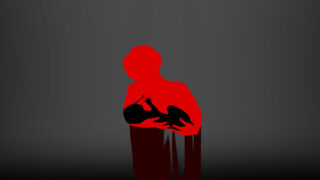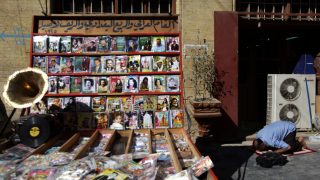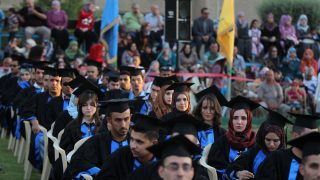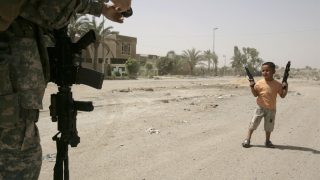The worsening security situation in Iraq is casting its shadow over the country’s social life. It is affecting the psychological state of many citizens, and has led to family violence.
Police stations throughout the capital have recorded cases of intra-family murder, the worst of which occurred in the area of al-Maamel on the outskirts of Baghdad. A young man shot his family members one after the other, killing his wife and newborn son, along with his brother and his brother's wife, who were sleeping on the roof of the house. He also killed his mother-in-law.
No one escaped from this massacre aside from his young nephew, who fled to a neighbor's house after suffering a single shot to the hand. It appears that the killer was suffering from a severe financial crisis that affected his mental health, and after he committed the crime he went to the nearest police station to confess.
In another incident, while a man was arguing with his wife, a fist fight morphed into a knife battle. When the wife wounded her husband, he took out a gun and fired several shots into her body. Because his three daughters wanted to stop him, he felt that they were biased towards the mother, and he turned his gun on them and killed them. One of the girls was a university student.
No one from the family survived, except for his only son who was absent at the time of the crime. The father is now in prison, while Ahmed — his 8-year-old son — lives alone in the abandoned house.
In another neighborhood of the capital, following a verbal altercation between two brothers, the eldest took out his gun and fired several bullets into the head of his younger brother. Following the killing, the father asked the family not to reveal the crime and the other family members stood by him.
They put their son's body in a bag and buried him in the garden, placing barrels and bags of trash over the burial site to disguise the location. They told relatives that their son had traveled to work in another province. However, a quarrel in the family led the father to go the police station and report the incident, two months after it occurred.
Samir Hamid, a researcher in the field of social sciences, attributes the prevalence of intra-family murder to the deterioration in living conditions and security.
"There is widespread poverty among most social groups, and weapons have spread and are being used by everyone. Moreover, Iraqi citizens are now characteristically easily provoked, as a result of the violence the country is still witnessing and feelings of a loss of security. This has led some to commit intra-family crimes," Hamid said.
She believes that "it is the responsibility of the government to solve problems related to unemployment and housing, and to establish hospitals for those with mental disorders, in order to reduce the crime that we are witnessing daily."
Hamid noted that official bodies were responsible for caring for the youth, and "if these bodies were in direct contact with the youth, this would allow for the spread of a culture of tolerance and non-violence, through the opening of cultural and entertainment forums."
According to reports issued by international organizations, scores of Iraqis are killed every week as a result of acts of murder and organized crime.
A study carried out by the Department of Sociology within the Faculty of Arts at the University of Baghdad — which was based on information gathered from police records from stations in the Rusafa district of the capital over the past year — showed that every week one person is killed during thefts and robberies in this part of the city. These crimes often occur in a variety of neighborhoods that are known for their low standard of living.
Another ugly aspect of this disaster is reflected in the widespread unemployment among those who are able to work. The rate of unemployment has doubled compared with what it was in the time of the former regime, rising from 30% to 60%. During a conference last October in the capital Baghdad — held at the initiative of civil society organizations in collaboration with the Ministry of Labor and Social Affairs — it was noted that 80% of graduates of institutes and universities in Iraq are unemployed.
Meanwhile, the government is not interested in confronting this issue or searching for ways to address this problem. This is in addition to limited activity within the private sector, which is not subjected to labor laws. These companies can dismiss workers as they please, without providing them any legal protection.
Every day, there are long lines in front of social welfare centers. The social welfare system — which is handled by the Ministry of Labor and Social Affairs — serves an estimated 478,000 beneficiaries in Baghdad alone. They receive a fixed monthly salary of 125,000 Iraqi dinars (approximately $100), which helps them meet their primary needs.
These lines include people from all walks of life, including men, women, the elderly and children, along with unemployed youth. However, corruption has even reached these centers. Their doors were closed at the beginning of this year, after it was discovered that tens of thousands of fictitious names were receiving payments in the provinces of Babil, Diwaniyah, Najar, Karbala and Muthanna.
In February, the cabinet decided to close these centers until the enactment of the Social Security law, which is one of the many projects currently stalled in parliament.
Despite the courts’ commitment to canceling tribal laws — which were issued after the 1958 revolution — tribes still depend on what is known as sunan (customary practices) in settling disputes between litigants. Many legal cases were never brought before the courts.
During a discussion of the general amnesty law in the current parliament, there were those that called for resorting to the tribal "clause" (or traditional settlements) for the release of those sentenced to capital punishment or life imprisonment who had perpetrated murder but did not fall within what is known as Article IV of the anti-terrorism law. The debate among the lawmakers confirmed their tribal approach, to pay blood money for the victim and grant the killer freedom.
Translated by Al-Monitor






